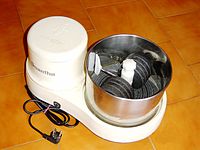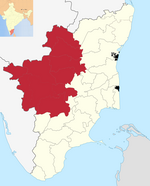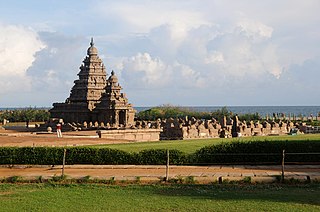
Tamil Nadu is the southernmost state of India. The tenth largest Indian state by area and the sixth largest by population, Tamil Nadu is the home of the Tamil people, whose Tamil language—one of the longest surviving classical languages in the world—is widely spoken in the state and serves as its official language. The capital and largest city is Chennai.

Coimbatore, also spelt as KoyamputhurTamil pronunciation: [koːjambʊt̪ːuːɾ], sometimes shortened as Kovai, is one of the major metropolitan cities in the Indian state of Tamil Nadu. It is located on the banks of the Noyyal River and surrounded by the Western Ghats. Coimbatore is the second largest city in Tamil Nadu after Chennai in terms of population and the 16th largest urban agglomeration in India as per the census 2011. It is administered by the Coimbatore Municipal Corporation and is the administrative capital of Coimbatore District. In 1981, Coimbatore formed as the third municipal corporation in Tamil Nadu after Chennai and Madurai. Podanur Junction is the oldest railway station in Coimbatore City. The city is one of the largest exporters of jewellery, wet grinders, poultry and auto components; the "Coimbatore Wet Grinder" and the "Kovai Cora Cotton" are recognised as Geographical Indications by the Government of India. Being a hub of textile industry in South India, the city is sometimes referred to as the "Manchester of South India". It was ranked the 7th best city in India in the Ease of Living index 2020.

South India, also known as Peninsular India, consists of the peninsular southern part of India. It encompasses the Indian states of Andhra Pradesh, Karnataka, Kerala, Tamil Nadu, and Telangana, as well as the union territories of the Lakshadweep and Puducherry, comprising 19.31% of India's area and 20% of India's population. Covering the southern part of the peninsular Deccan Plateau, South India is bounded by the Bay of Bengal in the east, the Arabian Sea in the west and the Indian Ocean in the south. The geography of the region is diverse with two mountain ranges – the Western and Eastern Ghats – bordering the plateau heartland. The Godavari, Krishna, Kaveri, Tungabhadra, Periyar, Bharathappuzha, Pamba, Thamirabarani, Palar, and Vaigai rivers are important perennial rivers.

Erode is a city in the Indian state of Tamil Nadu. Erode is the seventh largest urban agglomeration in the state, after Chennai, Coimbatore, Madurai, Tiruchirapalli, Tiruppur and Salem. It is also the administrative headquarters of the Erode district. Administered by a city municipal corporation since 2008, Erode is a part of Erode Lok Sabha constituency that elects its member of parliament. Located on the banks of River Kaveri, it is situated centrally on South Indian Peninsula, about 400 kilometres (249 mi) southwest of its state capital Chennai, 250 kilometres (155 mi) south of Bengaluru, 100 kilometres (62 mi) east of Coimbatore and 275 kilometres (171 mi) east of Kochi. Erode is an agricultural, textile and a BPO hub and among the largest producers of turmeric, hand-loom and knitwear, and food products.


A wet grinder can refer either to a tool for abrasive cutting of hard materials or to a food preparation appliance used especially in Indian cuisine for grinding food grains to produce a paste or batter. A wet grinder for abrasive cutting uses fluid for lubrication or cooling; for food preparation, a wet grinder combines water to grain as it is ground to produce a batter.

Coimbatore district is one of the 38 districts in the state of Tamil Nadu in India. Coimbatore is the administrative headquarters of the district. It is one of the most industrialized districts and a major textile, industrial, commercial, educational, information technology, healthcare and manufacturing hub of Tamil Nadu. The region is bounded by Tiruppur district in the east, Nilgiris district in the north, Erode district in the north-east, Palakkad district, Idukki district and small parts of Thrissur district and Ernakulam district of neighboring state of Kerala in the west and south respectively. As of 2011, Coimbatore district had a population of 3,458,045 with a sex-ratio of 1,000 and literacy rate of 84%.
'Economy of South India after independence in 1947 conformed to a socialist framework, with strict governmental control over private sector participation, foreign trade and foreign direct investment (FDI). Through 1960–1990, South Indian economies experienced mixed economic growth. In the 1960s, Kerala achieved above-average economic growth, while Andhra Pradesh's economy declined during this period. Similarly, Kerala experienced an economic decline in the 1970s while the economies of Tamil Nadu, Andhra Pradesh, and Karnataka consistently exceeded national average growth rates after 1970. Andhra Pradesh, Tamil Nadu and Karnataka were noted by some to be more reform-oriented in terms of economic policy when compared to other Indian states. Over the last decade South India has grown at 8% annually. Future economic growth will be shackled by a relatively low proportion of the active age population to the number of dependents.
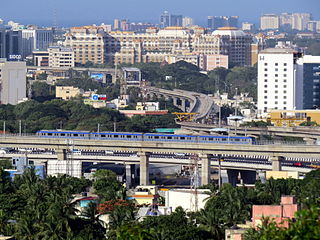
Tamil Nadu has the second largest state economy in India. It is also the most industrialised state in the country. The state is 48.40% urbanised, accounting for around 9.26% of the urban population in the country, while the state as a whole accounted for 5.96% of India's total population in the 2011 census. Services contributes to 54% to the gross domestic product of the state, followed by manufacturing at 33% and agriculture at 13%.

In Tamil Nadu, the Highways & Minor Ports Department (HMPD) is primarily responsible for construction and maintenance of roads including national highways, state highways and major district roads. HMPD was established as Highways Department (HD) in April 1946 and subsequently renamed on 30 October 2008. It operates through seven wings namely National Highways Wing, Construction & Maintenance Wing, NABARD and Rural Roads Wing, Projects Wing, Metro Wing, Tamil Nadu Road Sector Project Wing, Investigation and Designs Wing geographically spread across the state in 38 districts with about 120 divisions and 450 subdivisions.

Tamil Nadu, a state in South India, has a highly developed, dense, and modern transportation infrastructure, encompassing both public and private transport. Its capital city, Chennai is well-connected by land, sea, and air and serves as a major hub for entry into South India.
Economy of Coimbatore is heavily influenced by information technology, engineering and textiles. Coimbatore is called the Manchester of South India due to its extensive textile industry, and IT industry, small and medium scale enterprise gdp(gross domestic product) of Coimbatore city is around $20 billion in 2021.It is second largest city by GDP in Tamil Nadu. The city has four special economic zones [SEZ], ELCOT SEZ, KGISL SEZ, SPAN Venture SEZ, Aspen SEZ and at least five more SEZs are in the pipeline. In 2010, Coimbatore ranked 15th in the list of most competitive Indian cities.
Kovai Cora cotton or Kovai Kora cotton is a type of saree made in the Coimbatore region in Tamil Nadu, India. It has been recognized as a Geographical indication by the Government of India in 2014–15. The Devanga community are pioneers in weaving Kovai Kora cotton saris. 82 Weaver cooperative Societies in Coimbatore, Tiruppur and Erode are authorised to sell Kovai Kora cotton saris.

Tiruchirappalli railway division(Tamil: [ திருச்சிராப்பள்ளி ரயில் கோட்டம்]) is one of the six railway divisions of Southern Railway zone (SR) of India. It has its administrative headquarters located at Tiruchirappalli. It serves most of the districts of delta region and Central Tamil Nadu.

Make in India is an initiative by the Government of India to create and encourage companies to develop, manufacture and assemble products made in India and incentivize dedicated investments into manufacturing. The policy approach was to create a conducive environment for investments, develop a modern and efficient infrastructure, and open up new sectors for foreign capital. The initiative targeted 25 economic sectors for job creation and skill enhancement, and aimed "to transform India into a global design and manufacturing export hub."

The 2015 South India floods resulted from heavy rainfall generated by the annual northeast monsoon in November–December 2015. They affected the Coromandel Coast region of the South Indian states of Tamil Nadu and Andhra Pradesh. More than 500 people were killed and over 1.8 million people were displaced. With estimates of damages and losses ranging from nearly ₹200 billion (US$3 billion) to over ₹1 trillion (US$13 billion), the floods were the costliest to have occurred in 2015, and were among the costliest natural disasters of the year.
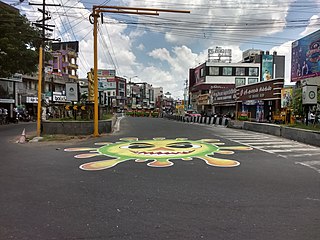
Tiruppur or Tirupur is a city in the Indian state of Tamil Nadu. Tiruppur is the administrative headquarters of Tiruppur district and the seventh largest city as well as an urban agglomeration in Tamil Nadu. Located on the banks of Noyyal River, it has been ruled at different times, by the Early Pandyas, Medieval Cholas, Later Cholas, Mysore Kingdom and the British. It is about 450 kilometres (280 mi) southwest of the state capital Chennai about 50 kilometres (31 mi) east of Coimbatore 50 kilometres (31 mi) south of Erode and 50 kilometres (31 mi) north of Dharapuram.
The Coimbatore Metropolitan Area, or Coimbatore Urban Agglomeration, is the sixteenth-most populous metropolitan area in India, the second most populous metropolitan area in the state of Tamil Nadu next only to Chennai. The Coimbatore Metropolitan Area consists of the city of Coimbatore and its suburbs in Coimbatore district.
Erode Turmeric or Erodu Manjal is a type of turmeric, a spice category which is grown in the Erode region of Tamil Nadu, India. It has been recognized as a Geographical indication by the Government of India in 2019. Erode turmeric is known for its high curcumin (>90%).
